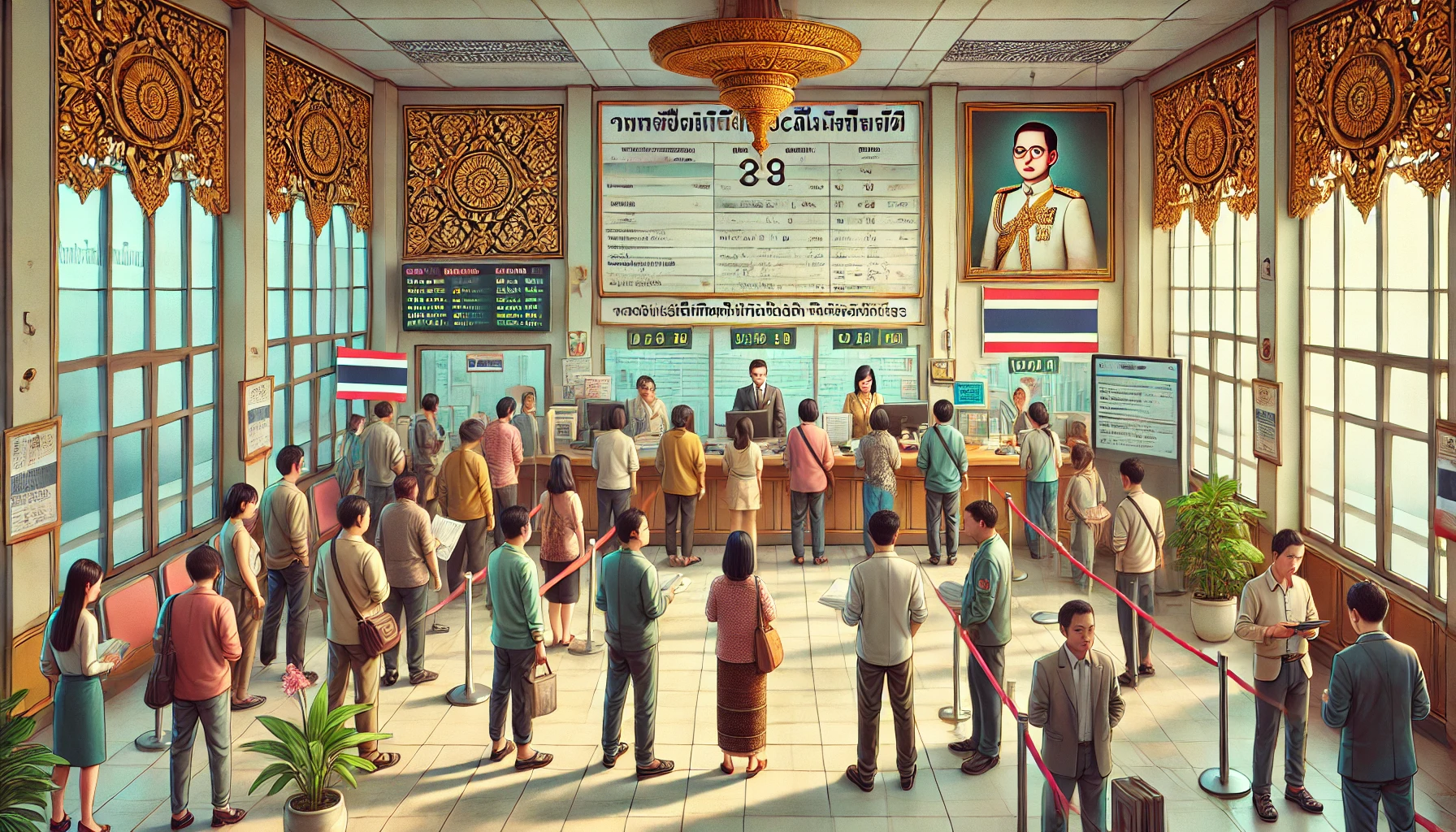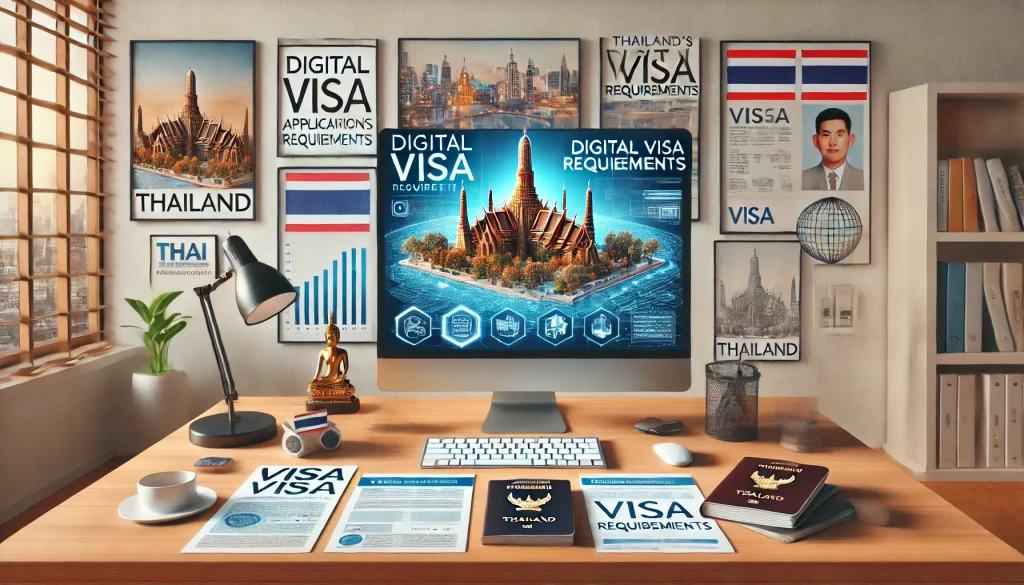📢 Attention digital nomads and remote workers! Are you dreaming of swapping your office view for Thailand’s pristine beaches? The allure of working from paradise is undeniable, but navigating the legal landscape of a foreign country can be daunting. 🏝️💻
Thailand’s Digital Nomad Visa (DTV) offers an exciting opportunity, but it comes with its own set of rules and regulations. Failing to comply could turn your tropical dream into a legal nightmare. From understanding visa requirements to tackling taxation issues, the road to legal compliance might seem like a maze. But fear not! We’re here to guide you through the intricacies of maintaining legal status while living your best digital nomad life in the Land of Smiles.
In this comprehensive guide, we’ll explore seven crucial aspects of legal compliance for DTV holders in Thailand. We’ll break down everything from registering with local authorities to navigating banking regulations, ensuring you’re well-equipped to work worry-free in your new Thai haven. Let’s dive in and unravel the secrets to a legally sound and blissful stay in Thailand! 🇹🇭✨
Understanding Thailand’s Digital Visa Requirements

Eligibility criteria for Digital Travel Visa (DTV)
To qualify for Thailand’s Digital Travel Visa (DTV), applicants must meet specific criteria:
- Minimum annual income of $80,000 for the past two years
- At least 5 years of professional experience in relevant fields
- Current employment with a company operating for at least 3 years
- Health insurance coverage of at least $50,000
| Criteria | Requirement |
|---|---|
| Annual Income | $80,000+ |
| Professional Experience | 5+ years |
| Company Tenure | 3+ years |
| Health Insurance | $50,000+ coverage |
Required documentation
Applicants must prepare the following documents:
- Valid passport with at least 6 months validity
- Proof of employment or company ownership
- Bank statements showing required income
- Professional portfolio or CV
- Criminal background check
- Proof of health insurance coverage
Application process
The DTV application process involves several steps:
- Online application submission
- Document verification
- Payment of visa fees
- Biometric data collection
- Visa approval and issuance
Visa duration and extension options
The initial DTV is valid for one year and can be extended for up to 5 years total. Extensions require:
- Proof of continued employment or business operations
- Maintained income levels
- Updated health insurance coverage
- Compliance with local regulations
Now that we’ve covered the DTV requirements, let’s explore the process of registering with local authorities to ensure full compliance during your stay in Thailand.
Registering with Local Authorities

90-day reporting procedure
The 90-day reporting is a crucial requirement for foreigners staying in Thailand on long-term visas, including the Digital Nomad Visa. This process involves notifying immigration authorities of your current address every 90 days.
Here’s a step-by-step guide to complete your 90-day report:
- Prepare necessary documents:
- Passport
- Previous 90-day report receipt (if applicable)
- TM6 departure card
- Proof of address
- Choose your reporting method:
- In-person at immigration office
- Online through the immigration website
- By mail
- Submit your report within the designated timeframe:
- 15 days before due date
- On the due date
- 7 days after due date (with potential fine)
| Reporting Method | Pros | Cons |
|---|---|---|
| In-person | Immediate confirmation | Time-consuming, queues |
| Online | Convenient, time-saving | System may be unreliable |
| By mail | No need to travel | Slower process, risk of loss |
TM30 form submission
The TM30 form, also known as the Notification of Residence for Foreigners, is another essential document for maintaining legal compliance in Thailand.
Key points about TM30:
- Property owners or managers must submit this form within 24 hours of a foreigner’s arrival
- Applies to both short-term visitors and long-term residents
- Can be submitted online or in-person at the immigration office
Importance of maintaining accurate address records
Keeping your address records up-to-date is vital for several reasons:
- Legal compliance: Ensures you meet visa requirements
- Communication: Allows authorities to contact you if necessary
- Emergency situations: Helps in locating you during crises
- Visa extensions: Accurate records simplify the extension process
Remember, failing to maintain accurate records can result in fines or even visa cancellation. Stay proactive in updating your information to avoid any legal complications during your stay in Thailand.
Taxation Compliance for Digital Nomads

Thailand’s tax residency rules
Thailand’s tax residency rules are crucial for digital nomads to understand. Generally, you’re considered a tax resident if you stay in Thailand for 180 days or more in a calendar year. This status affects your tax obligations significantly.
| Residency Status | Stay Duration | Tax Implications |
|---|---|---|
| Non-resident | Less than 180 days | Taxed only on Thai-source income |
| Resident | 180 days or more | Taxed on worldwide income |
Income reporting obligations
Digital nomads must report their income accurately to Thai authorities. This includes:
- Income from foreign sources
- Freelance earnings
- Online business revenues
- Investment income
Failure to report can result in penalties and legal issues.
Double taxation agreements
Thailand has double taxation agreements (DTAs) with many countries to prevent paying taxes twice on the same income. Key points:
- Check if your home country has a DTA with Thailand
- Understand which country has the right to tax different types of income
- Keep proper documentation to claim treaty benefits
Filing tax returns in Thailand
For those meeting the residency criteria, filing tax returns in Thailand is mandatory. Important aspects include:
- Tax year: Calendar year (January 1 to December 31)
- Filing deadline: March 31 of the following year
- Required documents: Income statements, receipts for deductions, passport copy
- E-filing option available for convenience
Understanding these tax obligations is essential for maintaining legal compliance while enjoying the digital nomad lifestyle in Thailand.
Work Permit Considerations

DTV vs. work permit distinctions
The Digital Nomad Visa (DTV) in Thailand is distinct from a traditional work permit. While the DTV allows digital nomads to stay and work remotely for foreign employers, it does not grant the right to work for Thai companies. Here’s a comparison:
| Feature | DTV | Work Permit |
|---|---|---|
| Duration | Up to 10 years | Typically 1-2 years |
| Employer | Foreign only | Thai company |
| Local work | Not allowed | Allowed |
| Tax implications | Limited | Full Thai tax liability |
| Application process | Streamlined | More complex |
Permitted activities under DTV
Under the DTV, digital nomads can engage in various activities without violating visa conditions:
- Remote work for foreign employers
- Attending business meetings or conferences
- Networking events
- Online freelancing for overseas clients
- Managing personal investments
It’s crucial to understand these limitations to avoid unintentional legal violations.
Consequences of unauthorized work
Engaging in unauthorized work while on a DTV can lead to severe consequences:
- Visa cancellation
- Deportation
- Fines up to 100,000 THB
- Potential ban from re-entering Thailand
To maintain compliance, always ensure your activities align with DTV regulations. If you’re considering local employment opportunities, it’s advisable to consult with immigration experts about transitioning to an appropriate work permit.
Health Insurance Requirements

Mandatory coverage amounts
To maintain legal compliance while on a Digital Nomad Visa (DTV) in Thailand, understanding the health insurance requirements is crucial. The Thai government mandates specific coverage amounts to ensure that digital nomads are adequately protected during their stay. Here’s a breakdown of the mandatory coverage:
| Coverage Type | Minimum Amount (THB) | Minimum Amount (USD) |
|---|---|---|
| Outpatient | 40,000 | Approx. 1,200 |
| Inpatient | 400,000 | Approx. 12,000 |
These amounts are the minimum required, and it’s often recommended to secure higher coverage for comprehensive protection.
Approved insurance providers
The Thai government maintains a list of approved insurance providers to ensure that digital nomads obtain reliable coverage. These providers include:
- Thai insurance companies
- International insurance companies with Thai partnerships
- Specialized digital nomad insurance providers
It’s essential to verify that your chosen provider is on the approved list to avoid complications with your visa application or renewal.
Proof of insurance documentation
When applying for or renewing your DTV, you’ll need to provide proof of your health insurance coverage. This typically includes:
- Insurance policy document
- Certificate of coverage
- Receipt of premium payment
Ensure that all documents clearly state the coverage amounts and duration, matching or exceeding the mandatory requirements. Keep digital and physical copies of these documents readily available throughout your stay in Thailand.
Banking and Financial Regulations

Opening a Thai bank account
For digital nomads in Thailand, opening a local bank account can greatly simplify financial transactions. However, the process can be challenging due to stringent regulations. Here’s what you need to know:
- Required documents:
- Valid passport
- Non-immigrant visa
- Work permit or letter from employer
- Proof of address (rental agreement or utility bill)
- Minimum deposit (varies by bank)
| Bank | Minimum Deposit | English Services |
|---|---|---|
| Bangkok Bank | 500 THB | Extensive |
| Kasikorn Bank | 1,000 THB | Good |
| Siam Commercial Bank | 1,000 THB | Limited |
Foreign currency transaction limits
Thailand imposes limits on foreign currency transactions to maintain financial stability:
- Daily limit: 200,000 THB for personal transfers
- Annual limit: 1,000,000 THB for outward remittances without specific documentation
Reporting international transfers
Digital nomads must be aware of reporting requirements for international transfers:
- Transfers exceeding 50,000 USD (or equivalent) must be reported to the Bank of Thailand
- Provide details on the purpose of the transfer
- Maintain records of all international transactions for potential audits
Cryptocurrency regulations
Thailand’s stance on cryptocurrencies is evolving:
- Trading is legal through licensed exchanges
- Crypto payments for goods and services are prohibited
- Capital gains from crypto trading are subject to 15% withholding tax
Digital nomads should stay informed about these regulations to ensure compliance while managing their finances in Thailand.
Respecting Local Laws and Customs

Cultural sensitivity in business practices
In Thailand, business etiquette is deeply rooted in cultural traditions. To maintain legal compliance and foster positive relationships, digital nomads should be aware of the following practices:
- Wai greeting: Use this traditional Thai greeting by pressing your palms together at chest level and bowing slightly
- Respect for hierarchy: Address senior colleagues or clients with appropriate titles
- Avoid confrontation: Thai culture values harmony, so handle disagreements diplomatically
| Do’s | Don’ts |
|---|---|
| Use formal titles | Touch someone’s head |
| Accept business cards with both hands | Point with your feet |
| Dress conservatively | Criticize the monarchy |
Dress codes and public behavior
Thailand has specific expectations for public conduct and attire:
- Dress modestly, especially when visiting temples or official buildings
- Remove shoes before entering homes or sacred places
- Avoid public displays of affection
- Stand for the national anthem, played daily at 8 AM and 6 PM
Restricted activities and substances
Digital nomads must be aware of and respect Thailand’s strict laws:
- Drug possession: Severe penalties, including potential death sentence for trafficking
- Alcohol restrictions: No sales between 2-5 PM and 12-11 AM in shops
- Gambling: Mostly illegal, with few exceptions like the national lottery
- Drone usage: Requires registration and permission in many areas
By adhering to these cultural norms and legal restrictions, digital nomads can ensure a respectful and compliant stay in Thailand. This awareness not only helps maintain legal status but also fosters positive interactions with locals and business contacts.
Navigating legal compliance while on a Digital Nomad Visa in Thailand requires careful attention to several key areas. From registering with local authorities and managing tax obligations to understanding work permit considerations and health insurance requirements, staying on the right side of Thai law is crucial for a smooth and enjoyable stay.
As you embark on your digital nomad journey in Thailand, remember to prioritize legal compliance. Stay informed about any changes in regulations, respect local customs, and maintain open communication with relevant authorities. By doing so, you’ll not only avoid potential legal issues but also contribute positively to the Thai community and pave the way for future digital nomads to enjoy this beautiful country.

